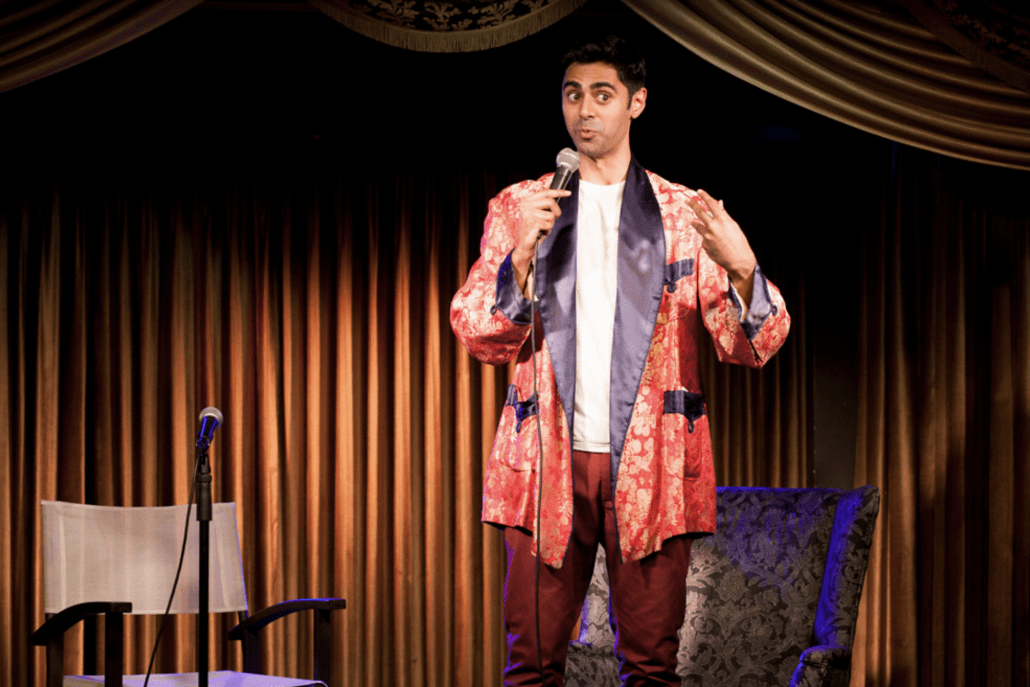COMIC RELIEF
Hasan Minhaj and the truth about comedy
A New Yorker exposé calls into question the morality of fiction in stand-up.
A New Yorker exposé calls into question the morality of fiction in stand-up.


Expecting truth from stand-up comedy is ridiculous. For the most part, personal anecdotes presented as facts should remain generally grounded. However, there is really no harm in fudging timelines or characters to make the joke land. I believe most comedy enthusiasts would have no qualms about those baselines.
How far a comedian can push the line between truth and fiction — now, that’s a point of contention.
Hasan Minhaj has found himself as the face of this debate. In September, The New Yorker published an exposé on Minhaj alleging a good portion of material from his two Netflix specials was exaggerated, fudged or fabricated.
In the specials — “Homecoming King” (2017) and “The King’s Jester” (2022) — Minhaj recounts stories from his life, including a white girl rejecting him on prom night, an FBI agent throwing him against a car and his baby getting rushed to the hospital because of an anthrax scare. As Clare Malone reported, these events — which are at the heart of his sets — had almost all their details fabricated.
The fabrications are an especially bad look for Minhaj, who has become known for his political commentary on shows like “The Daily Show” and “Patriot Act.” Maybe it’s not fair to Minhaj — that other stand-ups can fabricate without so much as a blink of an eye — but when he gained notoriety for his fact-based commentary, learning about the blurred reality of his storytelling work will undeniably make people question his credibility. In fact, Puck News reported that because of the article, Minhaj is no longer in consideration for the next “The Daily Show” host.
It’s also important to note that the stories The New Yorker points out as fictionalized (at least to some degree) involve Minhaj in dangerous situations stemming from bigotry based on his race and religion. While Minhaj said to The New Yorker that “the punchline is worth the fictionalized premise,” many of the “fictionalized premise[s]” are not created for punchlines but rather to stir emotions from the audience, as pointed out by New York Times comedy columnist Jason Zinoman.
Minhaj describes the stories as “emotional truths” — if the facts aren’t 100% accurate, the feelings conveyed are.
Zinoman shares the dangers of such fabrications, writing, “When stories told about racism, religious profiling or transgender identity are exposed as inventions, that can lead to doubt about the experiences of real people.”
On Oct. 26, Minhaj responded in a 21-minute video. In it, he called the article “misleading” and attempted to add context. He also said that although the exact details of his stories may be fabricated, the Islamophobia and racism he has experienced are real.
In a statement posted to X, formerly Twitter, Malone and The New Yorker stand by their story and fact-checking. The “Emotional Truths” article is almost certainly correct in its assertions of falsities. Minhaj’s response, although providing some more information about the situation, does not combat what is in the article. It’s an unflattering piece, for sure, but the validity of the claims seem to be tight.
I don’t entirely know how to feel about the situation. Minhaj is an undeniably talented writer and performer. His sets, with their “emotional truths,” are sharp, tight and brilliant examples of using comedy to spread a message and awareness. He knows how to talk to an audience, how to bring them along on a journey — which ultimately is why some fans felt betrayed by the discoverings of the New Yorker story.
If the specials were more clearly presented as a fictitious work, would the specials be as powerful? Probably not, interviewees of the New Yorker article agree. Is the end product of an admittedly excellent show worth the manipulation?
The student journalist in me clearly sides with Malone, Zinoman and the countless others who have covered this debacle. Truth and transparency are important; the work of The New Yorker was incredibly thorough and eye-opening. However, the comedy fan in me wants to overlook the situation. To fully believe that because it is comedy, however falsified the work may be, everything is OK in the creation of art.
I’ll leave the story with a quote from “The King’s Jester” that has been haunting me for days.
“I want to perform for reasonable people,” Minhaj said. “I want to be able to switch between satire and sincerity and trust that you know the difference. Trust that you won’t take me out of context. Everything here tonight is built on trust … You trust me. I trust you.”
Kimberly Aguirre is a junior writing about comedy. Her column, “Comic Relief,” runs every other Friday. She is also an associate managing editor at the Daily Trojan.
We are the only independent newspaper here at USC, run at every level by students. That means we aren’t tied down by any other interests but those of readers like you: the students, faculty, staff and South Central residents that together make up the USC community.
Independence is a double-edged sword: We have a unique lens into the University’s actions and policies, and can hold powerful figures accountable when others cannot. But that also means our budget is severely limited. We’re already spread thin as we compensate the writers, photographers, artists, designers and editors whose incredible work you see in our daily paper; as we work to revamp and expand our digital presence, we now have additional staff making podcasts, videos, webpages, our first ever magazine and social media content, who are at risk of being unable to receive the support they deserve.
We are therefore indebted to readers like you, who, by supporting us, help keep our paper daily (we are the only remaining college paper on the West Coast that prints every single weekday), independent, free and widely accessible.
Please consider supporting us. Even $1 goes a long way in supporting our work; if you are able, you can also support us with monthly, or even annual, donations. Thank you.
This site uses cookies. By continuing to browse the site, you are agreeing to our use of cookies.
Accept settingsDo Not AcceptWe may request cookies to be set on your device. We use cookies to let us know when you visit our websites, how you interact with us, to enrich your user experience, and to customize your relationship with our website.
Click on the different category headings to find out more. You can also change some of your preferences. Note that blocking some types of cookies may impact your experience on our websites and the services we are able to offer.
These cookies are strictly necessary to provide you with services available through our website and to use some of its features.
Because these cookies are strictly necessary to deliver the website, refusing them will have impact how our site functions. You always can block or delete cookies by changing your browser settings and force blocking all cookies on this website. But this will always prompt you to accept/refuse cookies when revisiting our site.
We fully respect if you want to refuse cookies but to avoid asking you again and again kindly allow us to store a cookie for that. You are free to opt out any time or opt in for other cookies to get a better experience. If you refuse cookies we will remove all set cookies in our domain.
We provide you with a list of stored cookies on your computer in our domain so you can check what we stored. Due to security reasons we are not able to show or modify cookies from other domains. You can check these in your browser security settings.
These cookies collect information that is used either in aggregate form to help us understand how our website is being used or how effective our marketing campaigns are, or to help us customize our website and application for you in order to enhance your experience.
If you do not want that we track your visit to our site you can disable tracking in your browser here:
We also use different external services like Google Webfonts, Google Maps, and external Video providers. Since these providers may collect personal data like your IP address we allow you to block them here. Please be aware that this might heavily reduce the functionality and appearance of our site. Changes will take effect once you reload the page.
Google Webfont Settings:
Google Map Settings:
Google reCaptcha Settings:
Vimeo and Youtube video embeds:
The following cookies are also needed - You can choose if you want to allow them:
